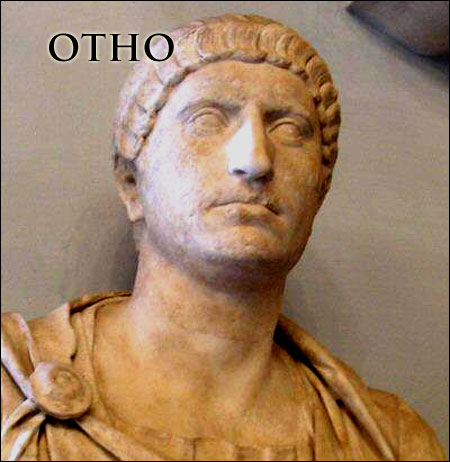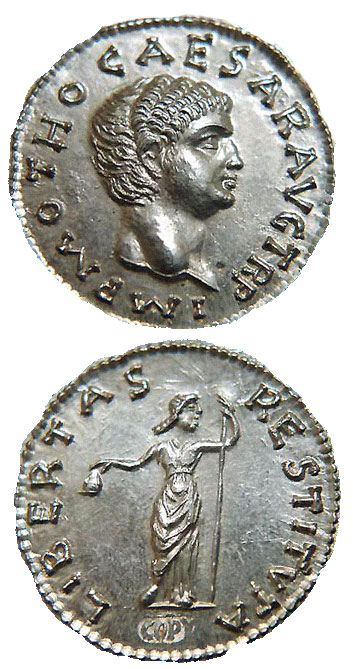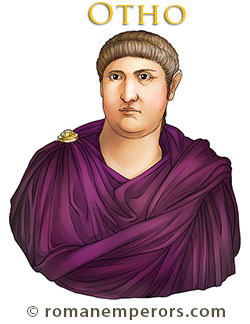Roman Emperor Otho
69 A.D.
Marcus Salvius Otho
Busts, Statues, Coins, Information, Maps, Images, and More

Otho: A Short Reign Marked by Ambition, Betrayal, and Tragedy
Marcus Otho, who reigned as Roman emperor for a mere three months in 69 AD, represents a fascinating, albeit brief, chapter in Roman history. His story is one of ambition, opportunism, love triangles, and ultimately, a tragic downfall.
Early Life and Political Ascendancy
Born in 32 AD into a wealthy Roman family, Otho enjoyed a life of privilege and education. He developed a reputation for flamboyant living and a taste for luxury. He befriended Nero's wife, Poppaea Sabina, and some accounts suggest a romantic relationship, highlighting his willingness to exploit connections for personal gain.
Otho's political career took off during Nero's reign. He held prestigious positions as governor of Lusitania (modern-day Portugal) and governor of the province of Africa. However, his loyalty to Nero wavered. When Nero's popularity plummeted in 68 AD, Otho saw an opportunity and defected to Galba, the governor of Hispania Tarraconensis (modern-day Spain) who had declared himself emperor.
A Betrayal and a Hasty Claim to Power
Galba, initially hesitant to trust Otho, eventually accepted his allegiance. However, Otho grew impatient. He saw Galba's indecisiveness regarding his successor as a threat and conspired with the Praetorian Guard, known for their loyalty to Nero and their desire for a more generous emperor.
In January of 69 AD, in a swift and bloody coup, the Praetorian Guard murdered Galba and Piso Licinianus, the chosen heir. Otho, capitalizing on the chaos, was declared emperor by the soldiers. The Senate, with little choice, confirmed his position.
A Popular Facade and Mounting Pressure
Otho initially attempted to cultivate a popular image. He promised reforms, offered financial rewards to the Praetorian Guard, and even recalled Poppaea Sabina's exiled sister. However, his lavish spending caused concern about the state of the treasury. Furthermore, his claim to the throne was challenged by another powerful figure – Vitellius, governor of Germania Inferior (modern-day western Germany) who had also been declared emperor by his legions.
A Civil War and a Desperate Gamble
The Roman Empire was now plunged into a civil war, with Otho's forces facing those of Vitellius. Otho, despite his lack of military experience, marched his army north to meet Vitellius' troops in a decisive battle.
The Battle of Bedriacum and a Self-Inflicted End
The Battle of Bedriacum, fought near Cremona in April of 69 AD, proved disastrous for Otho. He was decisively defeated by Vitellius' better-trained army. Facing certain capture and a humiliating defeat, Otho made a fateful decision. Rather than prolong the bloodshed, he chose suicide.
A Legacy of Ambition and a Cautionary Tale
Otho's reign lasted a mere three months. However, his story offers valuable insights into the complexities of Roman politics. It highlights the power and dangers of ambition, the fickleness of loyalty, and the brutal realities of civil war.
Questions and Considerations
Otho's motivations remain a subject of debate. Was he driven by a genuine desire to serve Rome, or was his ambition solely self-serving? Was his love for Poppaea Sabina a factor in his actions? These questions add a layer of intrigue to his brief and tragic reign.
A Turning Point in a Year of Emperors
Otho's death marked the end of his challenge to Vitellius. However, the civil war was far from over. Vitellius would eventually be defeated by the forces of Vespasian, who would go on to establish the Flavian dynasty. Otho's reign serves as a pivotal point within the tumultuous Year of the Four Emperors, a period of instability that ultimately paved the way for a new era in Roman history.
A Brief Reign but an Enduring Memory
Despite its brevity, Otho's reign serves as a reminder of the dangers of unchecked ambition and the fragility of power in ancient Rome. His story offers a glimpse into the ruthless nature of political maneuvering and the devastating consequences of civil war.

More to Come

"Contradiction"
When Galba had proved to be an incompetent ruler, Marcus Salvius Otho brought legions from the Rhine and had Galba murdered and seized the throne in 69 AD. After only four months of being Emperor he proved also incompetent. Suetonius spoke of Otho's "contradictory nature." That year he was defeated by the Roman general Vitellius, Otho committed suicide and Vitellius took the throne.

















Latest




Popular




Useful




